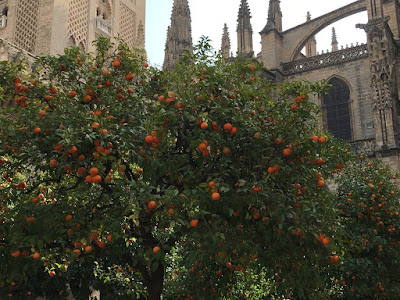This month, the
Insecure Writer's Support Group poses its monthly challenge question straight to the gut:
How are you doing?
Of course, the question is optional,
and I am a day late. Behind a little
on reading e-mail. Think I have an answer,
and then I don't. Distractions.
The pundits offer advice: Stick to a routine.
I am trying. Twelve years retired, I know
how to live simply. Begin each morning
with writing. I can be disciplined about that.
But these days, life's a bit more challenging.
Maybe we'll all have more empathy
for those who can't do what they wish to do.
Maybe I'll be like that little old lady, bent
slightly in front of empty grocery shelves,
or like a friend who's worried
her cancer medicine will run out, the same friend
who just bought twenty pounds of hamburger.
My car sits in the garage with gas enough
for 71 miles. Can I even go that far, if needed?
Just about a month ago, I caught a bad cold,
sitting next to a stranger on an airplane.
He was one of two wearing a mask.
Within a week, my husband began to sniffle;
now he has that raucous cough, just this side
of pneumonia. Yes, I worry.
Shouldn't we be volunteering somehow? I ask
my husband. "Honey," he replies,
"we're the group they're trying to protect."
I can't hug my daughter, her hubby,
those adorable grands. Trust me, FaceTime
is not a substitute.
Do the walls close in? Don't know.
We have downsized twice already.
Both DH and I have wanderlust.
Don't rattle those suitcases.
We'll go wherever, and I mean it.
Someone posted a game on Facebook
to list all the places you've lived. Ha!
How do I count eight months when we traveled those
countries that rim the Mediterranean? Or last month
in Tucson? Or when we first retired,
how we threw all into storage
and camped our way across country?
How do I count those moves, before I met DH,
into foster homes? I only remember six.
Or new schools with every move?
The walls don't matter. My home is here,
where we're together. Or at a library,
where he took me on our first date.
Once, traveling in Florida,
we stood in an airy, netted room with parakeets.
So innocent those colors. The birds fluttered
around us without thought. And I took
pure pleasure until that moment
when the parakeet perched atop my head
took a crap, that warm you-know-what
oozed down the back of my head.
We laughed and laughed and cleaned up
and went on, rather like now.
cherishing the moment.
 |
| Allen with Parakeets |
IWSG NOTE: I want to say thank you to those clever folk who hosted April and who prod us writers into sharing our thoughts once each month:
Diane Burton, JH Moncrieff, Anna @ Emaginette, Karen @ Reprobate Typewriter, Erika Beebe, and
Lisa Buie-Collard.
But the April question was hard. Maybe others had an easier time of going down to the bone. You can read what others have written by going
HERE. And I hope you do.
I also hope, wherever you are, that you and those you love are safe, reasonably comfortable, healthy, and loved. Our world may have changed, perhaps irrevocably, but our toughness and sense of community has not -- even with the news each day more challenging.









































